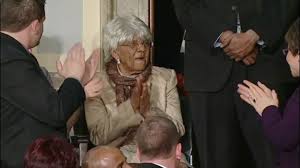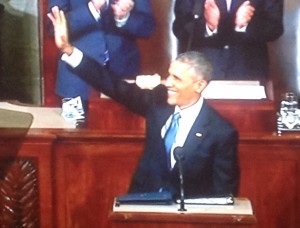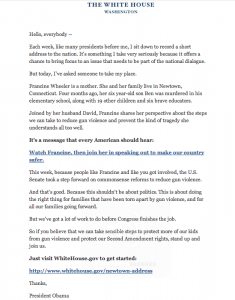 Desiline Victor is the woman who President Obama saluted during his State of the Union address last month. 102 years old, the Haitian-born Florida voter had waited in lines for more than six hours to vote last November. A couple weeks ago she heard news reports that in criticising the 1965 Voting Rights Act, which the Supreme Court may strike down, Justice Scalia had called the Act’s special provisions–which target states and locales with a history of discrimination–a “racial entitlement.” Outraged at this remark, she sent Scalia a letter that Ryan J. Reilly of Huffington Post shares with his readers today. According to Reilly,
Desiline Victor is the woman who President Obama saluted during his State of the Union address last month. 102 years old, the Haitian-born Florida voter had waited in lines for more than six hours to vote last November. A couple weeks ago she heard news reports that in criticising the 1965 Voting Rights Act, which the Supreme Court may strike down, Justice Scalia had called the Act’s special provisions–which target states and locales with a history of discrimination–a “racial entitlement.” Outraged at this remark, she sent Scalia a letter that Ryan J. Reilly of Huffington Post shares with his readers today. According to Reilly,
“Victor said she was ‘shocked’ when she heard what Scalia said about the Voting Rights Act during the Supreme Court’s oral arguments on a key provision of the law last month. ‘I thought you must not know what’s happening in this country,’ Victor wrote. ‘After learning more this year from the civil rights group, Advancement Project, I know that just as there were for me, there are barriers to voting for many people – especially people who are black or brown.’ Obama pointed to Victor, who waited in line for hours to vote at a polling place in Miami, as an example of why it was important to fix the nation’s broken election system.
‘I was born at a time when women were not allowed to vote in Haiti, nor the United States,” she continued. “After becoming a U.S. citizen, I was so proud to have a voice in this country. That is what inspired me to fight last year. But voting should never require such a fight. We need more make sure that all Americans can have their voices heard – we need the Voting Rights Act. Justice Scalia, the Voting Rights Act is not a racial entitlement. It is an important protection that helps all Americans exercise their right to vote. It was put in place because, sadly, there are people in this country who don’t want everyone to have an equal voice at the ballot box.'”
Victor’s full letter is pasted in below:
March 12, 2013
Dear Justice Scalia,
My name is Desiline Victor. I was born in Haiti in 1910, and I am 102 years old. After coming to the United States for a better life, today I am an American citizen and live with my family in North Miami. You might remember me from the State of the Union address last month, where President Obama told my story about how hard it was for me to vote.
When I heard what you said about the Voting Rights Act being a “racial entitlement,” I was shocked. I thought you must not know what’s happening in this country. After learning more this year from the civil rights group, Advancement Project, I know that just as there were for me, there are barriers to voting for many people – especially people who are black or brown. I also know that the Voting Rights Act is a way to protect the votes of communities that still face these problems. I would like to tell you about the struggles I faced in the last election.
During the early voting period in Florida last October, I went to my polling place early in the morning. The line was already very long, and wait times were as high as six hours. I stood for three hours before I started to get shaky on my feet, but no one could assist me unless I made it to the front of the line. In addition, there were no poll workers available who could help me in my native Kreyòl language, despite North Miami’s large Haitian community. I was told to come back later. I left. But I was determined to vote, so I tried again. On my second visit that night, I was happy when I finally cast my ballot. But I was also upset. In this great nation why should anybody have to stand in line for hours, and make two trips, to vote?
Not everybody persevered as I did. I learned later that hundreds of thousands of voters in Florida gave up and went home without voting, and that Black and Latino voters were more likely to face those shamefully long lines and wait times. One reason was a new law that cut the early voting period. Around the country, other new laws were passed that made voting harder in 2012 – but Section 5 of the Voting Rights Act blocked many of them before the election. Section 5 also helps voters in other ways. In the five counties in Florida that are covered, voting help in Spanish and Kreyòl is required because of their large Latino and Haitian populations.
I was born at a time when women were not allowed to vote in Haiti, nor the United States. After becoming a U.S. citizen, I was so proud to have a voice in this country. That is what inspired me to fight last year. But voting should never require such a fight. We need more make sure that all Americans can have their voices heard – we need the Voting Rights Act. Justice Scalia, the Voting Rights Act is not a racial entitlement. It is an important protection that helps all Americans exercise their right to vote. It was put in place because, sadly, there are people in this country who don’t want everyone to have an equal voice at the ballot box.
Equality and the right to vote are the shining lights of American democracy that drew me to these shores, and that right should not be taken away. In fact, it should be made stronger to help more voters who faced obstacles like I did.
Sincerely,
Desiline Victor





